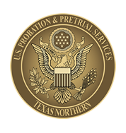What Supervision Is
In the federal courts, supervision is
- a core responsibility of U.S. probation and pretrial services officers, along with investigation.
- a way to monitor the activities and behavior of people released to the community by the federal courts or paroling authorities.
- an opportunity to help offenders reintegrate into the community following a period of incarceration.
- in the case of probation, a punishment that is less severe than imprisonment, but still holds people accountable for breaking the law.
- an alternative to jail or prison that costs less than incarceration and gives people charged with or convicted of federal crimes the opportunity to live with their families, hold jobs, and be productive members of society.
What It Accomplishes
Supervision addresses several key criminal justice goals. Through supervision, officers:
- Enforce the court's order. Officers make sure people on supervision comply with the conditions the court has set for their release to the community.
- Protect the community. Officers reduce the risk that people on supervision commit crimes. They also reduce the risk that people who are awaiting trial flee rather than return to court as required.
- Provide treatment and assistance. Officers help people on supervision correct problems that may be linked to their criminal behavior by directing them to services to help them. These services may include substance abuse or mental health treatment, medical care, training, or employment assistance.
How Officers Supervise
In working with people on supervision, officers
- inform them of what the court expects of them.
- meet with them at home and at work.
- monitor their compliance with the conditions the court has set for their release.
- step in to control and correct if they don't comply.
Release Conditions
Release conditions are rules set by the court that people on supervision must follow if they want to remain in the community. The court imposes release conditions to help structure the person's actions and activities. For example, release conditions may
- prohibit possession of guns or other weapons.
- prohibit contact with victims or witnesses.
- restrict association with certain persons.
- restrict travel.
- impose a curfew.
Common Terms
Community Service - A special condition the court imposes that requires an individual to work – without pay – for a civic or nonprofit organization.
Mental Health Treatment - A special condition the court imposes to require an individual to undergo evaluation and treatment for a mental disorder. Treatment may include psychiatric, psychological, and sex offense-specific evaluations, inpatient or outpatient counseling, and medication.
Parole - The release of a prison inmate – granted by the U.S. Parole Commission – after the inmate has completed part of his or her sentence in a federal prison. When the parolee is released to the community, he or she is placed under the supervision of a U.S. probation officer. The Sentencing Reform Act of 1984 abolished parole in favor of a determinate sentencing system in which the sentence is set by sentencing guidelines. Now, without the option of parole, the term of imprisonment the court imposes is the actual time the person spends in prison.
Pretrial Services - A function of the federal courts that takes place at the very start of the criminal justice process – after a person has been arrested and charged with a federal crime and before he or she goes to trial. Pretrial services officers focus on investigating the backgrounds of these persons to help the court determine whether to release or detain them while they await trial. The decision is based on whether these individuals are likely to flee or pose a threat to the community. If the court orders release, a pretrial services officer supervises the person in the community until he or she returns to court.
Probation - A sentencing option in the federal courts. With probation, instead of sending an individual to prison, the court releases the person to the community and orders him or her to complete a period of supervision monitored by a U.S. probation officer and to abide by certain conditions.
Substance Abuse Treatment - A special condition the court imposes that requires an individual to undergo testing and treatment for abuse of illegal drugs, prescription drugs, or alcohol. Treatment may include inpatient or outpatient counseling and detoxification.
Supervised Release - A term of supervision served after a person is released from prison. The court imposes supervised release during sentencing in addition to the sentence of imprisonment. Unlike parole, supervised release does not replace a portion of the sentence of imprisonment but is in addition to the time spent in prison. U.S. probation officers supervise persons on supervised release.
